定语从句中只能使用that的情况
- 格式:doc
- 大小:431.50 KB
- 文档页数:65
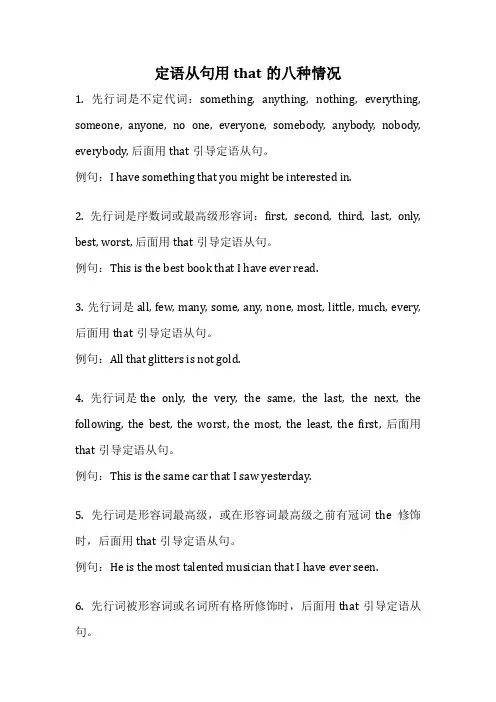
定语从句用that的八种情况1. 先行词是不定代词:something, anything, nothing, everything, someone, anyone, no one, everyone, somebody, anybody, nobody, everybody, 后面用that引导定语从句。
例句:I have something that you might be interested in.2. 先行词是序数词或最高级形容词:first, second, third, last, only, best, worst, 后面用that引导定语从句。
例句:This is the best book that I have ever read.3. 先行词是all, few, many, some, any, none, most, little, much, every, 后面用that引导定语从句。
例句:All that glitters is not gold.4. 先行词是the only, the very, the same, the last, the next, the following, the best, the worst, the most, the least, the first, 后面用that引导定语从句。
例句:This is the same car that I saw yesterday.5. 先行词是形容词最高级,或在形容词最高级之前有冠词the修饰时,后面用that引导定语从句。
例句:He is the most talented musician that I have ever seen.6. 先行词被形容词或名词所有格所修饰时,后面用that引导定语从句。
例句:This is the house that John built.7. 先行词是被强调的词时,后面用that引导定语从句。
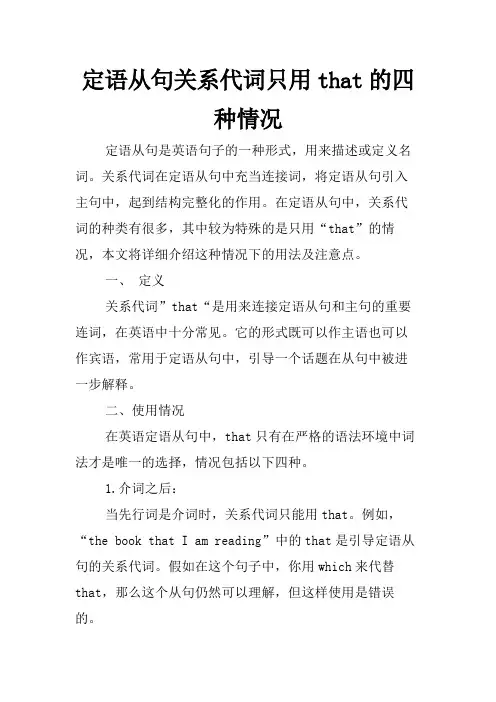
定语从句关系代词只用that的四种情况定语从句是英语句子的一种形式,用来描述或定义名词。
关系代词在定语从句中充当连接词,将定语从句引入主句中,起到结构完整化的作用。
在定语从句中,关系代词的种类有很多,其中较为特殊的是只用“that”的情况,本文将详细介绍这种情况下的用法及注意点。
一、定义关系代词”that“是用来连接定语从句和主句的重要连词,在英语中十分常见。
它的形式既可以作主语也可以作宾语,常用于定语从句中,引导一个话题在从句中被进一步解释。
二、使用情况在英语定语从句中,that只有在严格的语法环境中词法才是唯一的选择,情况包括以下四种。
1.介词之后:当先行词是介词时,关系代词只能用that。
例如,“the book that I am reading”中的that是引导定语从句的关系代词。
假如在这个句子中,你用which来代替that,那么这个从句仍然可以理解,但这样使用是错误的。
正确:The book that I am reading.错误:The book which I am reading.2.形容词之后:如果形容词修饰名词,其中包含有定语从句,而先行词又在从句里作宾语,就必须使用that。
例如,“This is the man that I saw on TV yesterday”。
正确:This is the man that I saw on TV yesterday.错误:This is the man which I saw on TV yesterday.3.最高级别形容词之后:当最高级别形容词修饰的名词在定语从句中作先行词时,只能用that,而不用which或者who。
例如,“This is the best d ay that I've ever had in my life”。
正确:This is the best day that I've ever hadin my life.错误:This is the best day which I've ever had in my life.4.不定代词之后:不定代词(如something,anything,nothing,everyone,everybody等)以及不定副词(如somewhere,anywhere,nowhere等)后面的定语从句,只能用that。
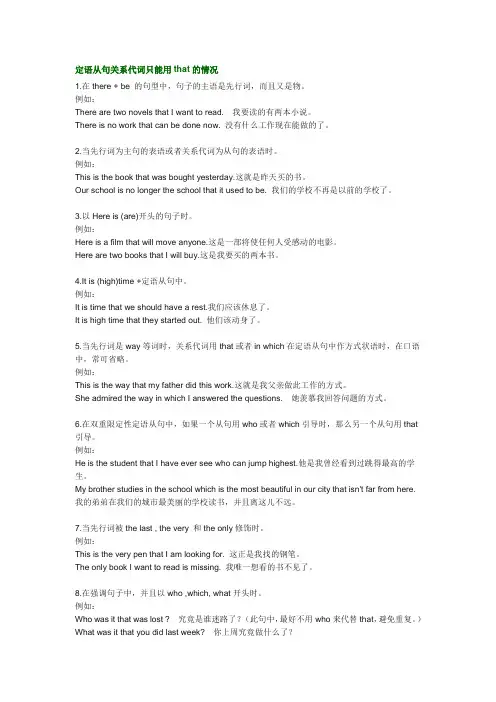
定语从句关系代词只能用that的情况1.在there + be 的句型中,句子的主语是先行词,而且又是物。
例如:There are two novels that I want to read.我要读的有两本小说。
There is no work that can be done now. 没有什么工作现在能做的了。
2.当先行词为主句的表语或者关系代词为从句的表语时。
例如:This is the book that was bought yesterday.这就是昨天买的书。
Our school is no longer the school that it used to be. 我们的学校不再是以前的学校了。
3.以Here is (are)开头的句子时。
例如:Here is a film that will move anyone.这是一部将使任何人受感动的电影。
Here are two books that I will buy.这是我要买的两本书。
4.It is (high)time +定语从句中。
例如:It is time that we should have a rest.我们应该休息了。
It is high time that they started out. 他们该动身了。
5.当先行词是way等词时,关系代词用that或者in which在定语从句中作方式状语时,在口语中,常可省略。
例如:This is the way that my father did this work.这就是我父亲做此工作的方式。
She admired the way in which I answered the questions.她羡慕我回答问题的方式。
6.在双重限定性定语从句中,如果一个从句用who或者which引导时,那么另一个从句用that 引导。
例如:He is the student that I have ever see who can jump highest.他是我曾经看到过跳得最高的学生。
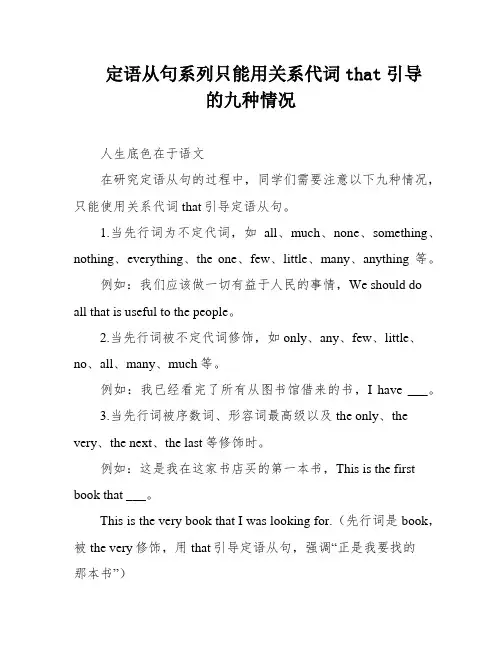
定语从句系列只能用关系代词that引导的九种情况人生底色在于语文在研究定语从句的过程中,同学们需要注意以下九种情况,只能使用关系代词that引导定语从句。
1.当先行词为不定代词,如all、much、none、something、nothing、everything、the one、few、little、many、anything等。
例如:我们应该做一切有益于人民的事情,We should do all that is useful to the people。
2.当先行词被不定代词修饰,如only、any、few、little、no、all、many、much等。
例如:我已经看完了所有从图书馆借来的书,I have ___。
3.当先行词被序数词、形容词最高级以及the only、the very、the next、the last等修饰时。
例如:这是我在这家书店买的第一本书,This is the first book that ___。
This is the very book that I was looking for.(先行词是book,被the very修饰,用that引导定语从句,强调“正是我要找的那本书”)3、先行词既指人又指物时The person and the car that I saw were both gone.(先行词是person和car,都指人和物,用that引导定语从句,修饰两者都已经不见了)4、关系代词在限制性定语从句中作表语,并带有比较的含义时The movie is not as good as what I expected it to be.(关系代词what作表语,带有比较含义,修饰movie)5、句子的前一部分已经出现了which,为避免重复,句子的后面部分通常不再用which而用that来引导限制性定语从句The book。
which I borrowed from the library。
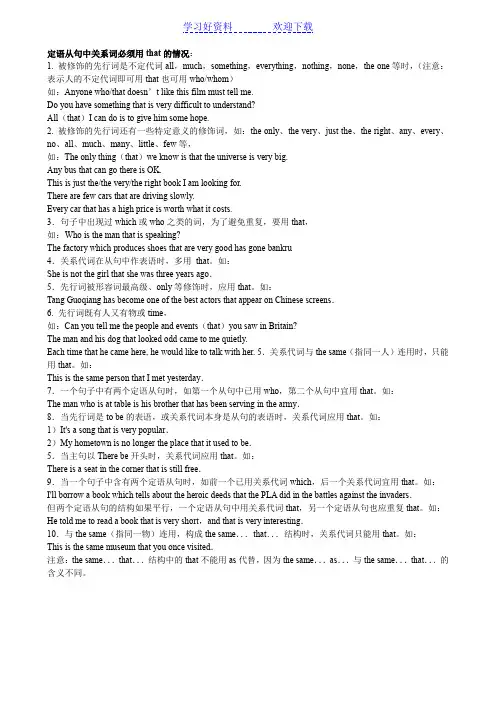
学习好资料欢迎下载定语从句中关系词必须用that的情况:1. 被修饰的先行词是不定代词all,much,something,everything,nothing,none,the one等时,(注意:表示人的不定代词即可用that也可用who/whom)如:Anyone who/that doesn’t like this film must tell me.Do you have something that is very difficult to understand?All(that)I can do is to give him some hope.2. 被修饰的先行词还有一些特定意义的修饰词,如:the only、the very、just the、the right、any、every、no、all、much、many、little、few等,如:The only thing(that)we know is that the universe is very big.Any bus that can go there is OK.This is just the/the very/the right book I am looking for.There are few cars that are driving slowly.Every car that has a high price is worth what it costs.3.句子中出现过which或who之类的词,为了避免重复,要用that,如:Who is the man that is speaking?The factory which produces shoes that are very good has gone bankru4.关系代词在从句中作表语时,多用that。
如:She is not the girl that she was three years ago.5.先行词被形容词最高级、only等修饰时,应用that。
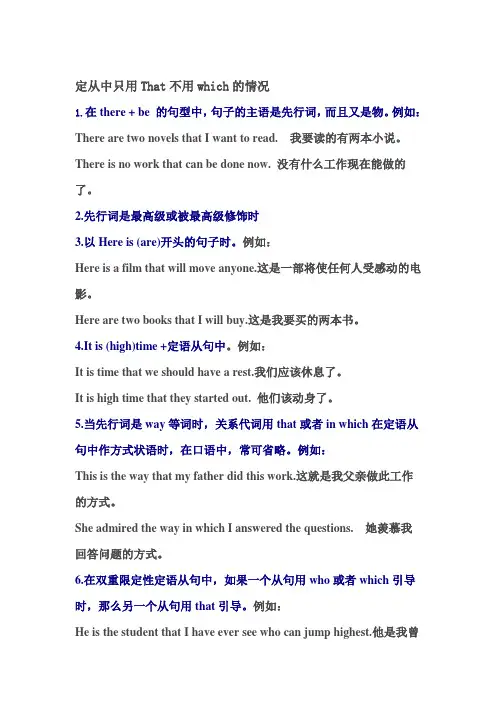
定从中只用That不用which的情况1.在there + be 的句型中,句子的主语是先行词,而且又是物。
例如:There are two novels that I want to read.我要读的有两本小说。
There is no work that can be done now. 没有什么工作现在能做的了。
2.先行词是最高级或被最高级修饰时3.以Here is (are)开头的句子时。
例如:Here is a film that will move anyone.这是一部将使任何人受感动的电影。
Here are two books that I will buy.这是我要买的两本书。
4.It is (high)time +定语从句中。
例如:It is time that we should have a rest.我们应该休息了。
It is high time that they started out. 他们该动身了。
5.当先行词是way等词时,关系代词用that或者in which在定语从句中作方式状语时,在口语中,常可省略。
例如:This is the way that my father did this work.这就是我父亲做此工作的方式。
She admired the way in which I answered the questions.她羡慕我回答问题的方式。
6.在双重限定性定语从句中,如果一个从句用who或者which引导时,那么另一个从句用that引导。
例如:He is the student that I have ever see who can jump highest.他是我曾经看到过跳得最高的学生。
My brother studies in the school which is the most beautiful in our city that isn’t far from here. 我的弟弟在我们的城市最美丽的学校读书,并且离这儿不远。
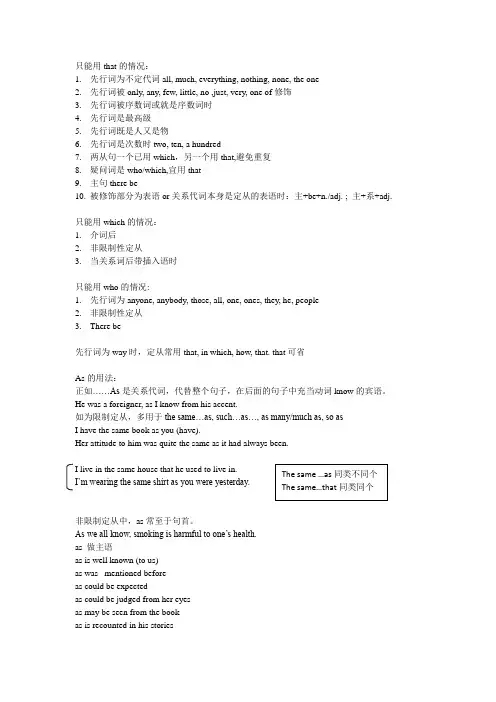
只能用that 的情况:1. 先行词为不定代词all, much, everything, nothing, none, the one2. 先行词被only, any, few, little, no ,just, very, one of 修饰3. 先行词被序数词或就是序数词时4. 先行词是最高级5. 先行词既是人又是物6. 先行词是次数时two, ten, a hundred7. 两从句一个已用which ,另一个用that,避免重复8. 疑问词是who/which,宜用that9. 主句there be10. 被修饰部分为表语or 关系代词本身是定从的表语时:主+be+n./adj. ; 主+系+adj.只能用which 的情况:1. 介词后2. 非限制性定从3. 当关系词后带插入语时只能用who 的情况:1. 先行词为anyone, anybody, those, all, one, ones, they, he, people2. 非限制性定从3. There be先行词为way 时,定从常用that, in which, how, that. that 可省As 的用法:正如……As 是关系代词,代替整个句子,在后面的句子中充当动词know 的宾语。
He was a foreigner, as I know from his accent.如为限制定从,多用于the same…as, such…as…, as many/much as, so asI have the same book as you (have).Her attitude to him was quite the same as it had always been.I live in the same house that he used to live in. I’m wearing the same shirt as you were yesterday.非限制定从中,as 常至于句首。
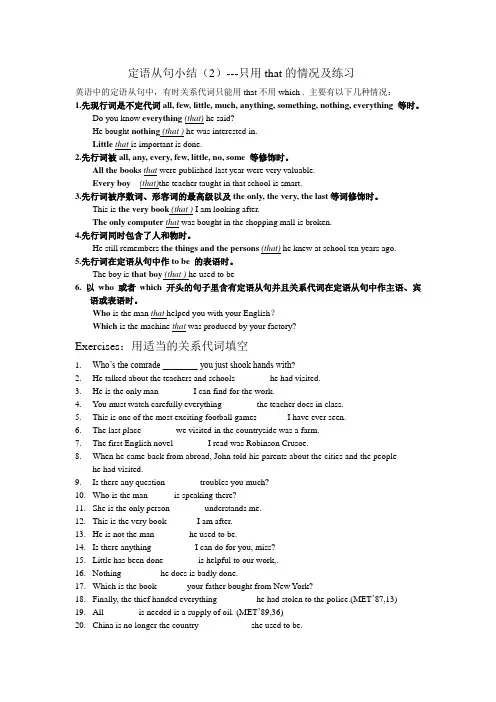
定语从句小结(2)---只用that的情况及练习英语中的定语从句中,有时关系代词只能用that不用which . 主要有以下几种情况:1.先现行词是不定代词all, few, little, much, anything, something, nothing, everything 等时。
Do you know everything(that) he said?He bought nothing (that ) he was interested in.Little that is important is done.2.先行词被all, any, every, few, little, no, some 等修饰时。
All the books that were published last year were very valuable.Every boy(that)the teacher taught in that school is smart.3.先行词被序数词、形容词的最高级以及the only, the very, the last等词修饰时。
This is the very book (that ) I am looking after.The only computer that was bought in the shopping mall is broken.4.先行词同时包含了人和物时。
He still remembers the things and the persons (that) he knew at school ten years ago.5.先行词在定语从句中作to be 的表语时。
The boy is that boy (that ) he used to be6.以who 或者which 开头的句子里含有定语从句并且关系代词在定语从句中作主语、宾语或表语时。
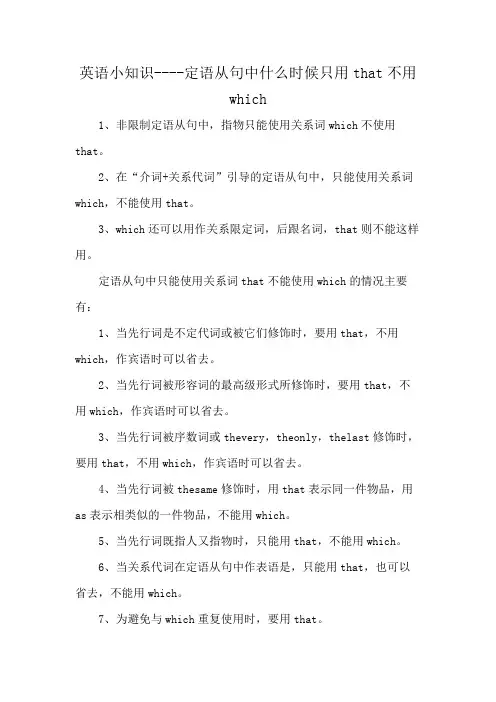
英语小知识----定语从句中什么时候只用that不用
which
1、非限制定语从句中,指物只能使用关系词which不使用that。
2、在“介词+关系代词”引导的定语从句中,只能使用关系词which,不能使用that。
3、which还可以用作关系限定词,后跟名词,that则不能这样用。
定语从句中只能使用关系词that不能使用which的情况主要有:
1、当先行词是不定代词或被它们修饰时,要用that,不用which,作宾语时可以省去。
2、当先行词被形容词的最高级形式所修饰时,要用that,不用which,作宾语时可以省去。
3、当先行词被序数词或thevery,theonly,thelast修饰时,要用that,不用which,作宾语时可以省去。
4、当先行词被thesame修饰时,用that表示同一件物品,用as表示相类似的一件物品,不能用which。
5、当先行词既指人又指物时,只能用that,不能用which。
6、当关系代词在定语从句中作表语是,只能用that,也可以省去,不能用which。
7、为避免与which重复使用时,要用that。

1.当先行词是all /much /little/few /something /anything /everything /nothing/none等不定代词的时候,在定语从句中,先行词只能用that.例如:Is there anything that I can do for you?有我可以为你做的事情吗?(冉老师有话说:这是一个there be结构的一般疑问句,不明白该知识点的小伙伴可以查阅冉老师历史发文。
句子的先行词是不定代词anything,所以关系代词只能用that。
)2.当先行词前面有all/no/little/few/any等修饰时,只能用关系代词that。
例如:I have finished all my homework that our teacher distributed yesterday.我已经完成了所有老师昨天发下来的家庭作业。
(冉老师有话说:主句为现在完成时,不明白该知识点的小伙伴可以查阅冉老师历史发文。
先行词homework前有all,所以关系代词只能用that。
从句的时间为yesterday“昨天”属于过去的时间状语,所以要用一般过去时。
distributed为distribute“分配;分发”的一般过去时。
)3.当先行词被the/only/the last/the very修饰的时候,定语从句只能用that。
例如:Eating is the only thing that interest me.吃是唯一一件使我感兴趣的事情。
(冉老师有话说:该句子的先行词是thing且用了the only修饰,所以关系代词只能用that。
关于动词ing形式做主语的语法冉老师会在后期更新。
)4.当先行词是序数词或被序数词修饰时,关系词只能用that。
例如:I'm the first student that passed the exam.我是第一个通过考试的人。
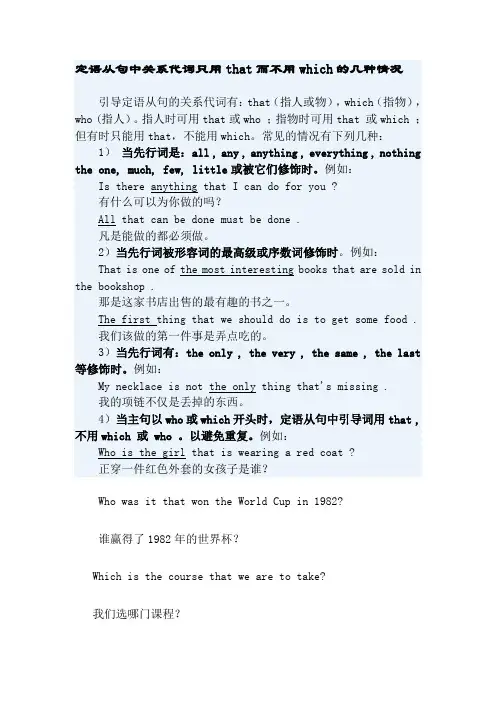
定语从句中关系代词只用that而不用which的几种情况引导定语从句的关系代词有:that(指人或物),which(指物),who (指人)。
指人时可用that或who ;指物时可用that 或which ;但有时只能用that,不能用which。
常见的情况有下列几种:1)当先行词是:all , any , anything , everything , nothing the one, much, few, little或被它们修饰时。
例如:Is there anything that I can do for you ?有什么可以为你做的吗?All that can be done must be done .凡是能做的都必须做。
2)当先行词被形容词的最高级或序数词修饰时。
例如:That is one of the most interesting books that are sold in the bookshop .那是这家书店出售的最有趣的书之一。
The first thing that we should do is to get some food .我们该做的第一件事是弄点吃的。
3)当先行词有:the only , the very , the same , the last 等修饰时。
例如:My necklace is not the only thing that's missing .我的项链不仅是丢掉的东西。
4)当主句以who或which开头时,定语从句中引导词用that ,不用which 或 who 。
以避免重复。
例如:Who is the girl that is wearing a red coat ?正穿一件红色外套的女孩子是谁?Who was it that won the World Cup in 1982?谁赢得了1982年的世界杯?Which is the course that we are to take?我们选哪门课程?5)当先行词是既有人又有物的并列词组时,用that 。
一、定语从句只用that的情况口诀1. 先行词all, everyone, anything, nothing, something前that2. the+序数词或形容词最高级+关系从句 that代替3. 先行词被all, much, little, no, any, some等修饰时用that4. 先行词被every, only, very, few, same, last修饰时用that5. 先行词既有人又有物用that6. 先行词后有by which等介词词组that代替7. 合并句子时用that代替二、详细解析1. 先行词all, everyone, anything, nothing, something前that例句:There is nothing that can stop us from achieving our goal.2. the+序数词或形容词最高级+关系从句 that代替例句:This is the best movie that I have ever watched.3. 先行词被all, much, little, no, any, some等修饰时用that例句:I have not heard of any news that can prove your theory.4. 先行词被every, only, very, few, same, last修饰时用that例句:This is the only book that I have read recently.5. 先行词既有人又有物用that例句:He is the only person that I trust in thispany.6. 先行词后有by which等介词词组that代替例句:He showed me the way that I could get to the 本人rport by the shortest path.7. 合并句子时用that代替例句:She told me that she wille to see me next week.以上便是定语从句中只用that的七种情况口诀,掌握了这七种情况,就能更加灵活地运用定语从句,使语言表达更加准确、地道。
定语从句中只用that的几种情况
1.I don't think there's anything that can stop him.
我认为没有什么能阻止他。
2.This is the first time that I've ever seen such a performance.这是我第一次看到这样的表演。
3.All the money that you earned has been saved.
你赚的所有钱都存起来了。
4.The teacher and the textbooks that are essential for the course are ready.
对于这门课程来说,老师和教科书都准备好了。
5.There was a man that wanted to speak with you.
有一个人想和你说话。
6.It was the encouragement that she gave me that helped me succeed.
正是她给予我的鼓励帮助我成功。
7.That he arrived late was a fact that surprised everyone.
他迟到是一个让所有人都感到惊讶的事实。
8.The car that broke down was brand new.
那辆抛锚的车是全新的。
定语从句只用that的八种情况1. 当先行词是不定代词的时候就得用that 啦,比如说“All that glitters is not gold.”(发光的不都是金子呀。
)2. 先行词被序数词修饰的时候,那肯定得是 that 呀,就像“ The first thing that I want to do is to take a rest.”(我想做的第一件事就是休息一下。
)3. 先行词被形容词最高级修饰时,只能用 that 哦,例如“ This is the best movie that I have ever seen.”(这是我看过的最好的电影呢。
)4. 先行词既有人又有物的时候,不用that 还能用啥呢,像“ They talked about the persons and things that they remembered.”(他们谈论着他们记得的人和事呀。
)5. 当先行词被 the very,the only 等修饰时,那就是 that 没跑啦,比如“This is the very book that I am looking for.”(这就是我正在找的那本书哟。
)6. 当主句是以 who 或 which 开头的疑问句时,后面不也得是 that 嘛,像“ Who is the man that is standing there?”(站在那儿的那个男人是谁呀?)7. 当先行词在定语从句中作表语时,肯定得选 that 呀,例如“ China is not the country that it was.”(中国已不是过去的中国了。
)8. 当先行词是数词时,也得用 that 呀,像“ Three people died in the accident that happened yesterday.”(在昨天发生的事故中有三人丧生。
)我的观点结论就是:这些情况可都得记住呀,这样在使用定语从句的时候就不会出错啦!。
定语从句中:只用that而不用which的五种情况引导定语从句的关系代词有:that(指人或物),which(指物),who (指人)。
指人时可用that或who ;指物时可用that 或which ;但有时只能用that,不能用which。
常见的情况有下列五种:1)当先行词是:all , any , anything , everything , nothing或被它们修饰时。
例如:Is there anything that I can do for you ?有什么可以为你做的吗?All that can be done must be done .凡是能做的都必须做。
2)当先行词被形容词的最高级或序数词修饰时。
例如:That is one of the most interesting books that are sold in the bookshop .那是这家书店出售的最有趣的书之一。
The first thing that we should do is to get some food .我们该做的第一件事是弄点吃的。
3)当先行词有:the only , the very , the same , the last 等修饰时。
例如:My necklace is not the only thing that's missing .我的项链不仅是丢掉的东西。
4)当主句以who或which开头时,定语从句中引导词用that ,不用which 或who 。
以避免重复。
例如:Who is the girl that is wearing a red coat ?正穿一件红色外套的女孩子是谁?5)当先行词既有人又有物时,用that 。
例如:The writer and his novel that you have just talked about are really well known .你刚才谈起的那位作家以及他的小说确实很著名。
定语从句系列:只能用关系代词that引导的九种情况人生底色看语文18-03-1200:48什么情况下,定语从句中只能用that?本文将解决这个问题。
为大家总结,只能用关系代词that引导的定语从句之九种情况。
在定语从句中,当先行词表示物的时候,引导定语从句的关系代词,可以用that, 也可以用which. 但是通常在以下几种情况下, 只能用that, 同学们在学习过程中要引起注意。
1.当先行词为all, much, none, something, nothing, everything, the one, few, little, many, anything等不定代词时。
例如:We should do all that is useful to the people. 我们应该做一切有益于人民的事情。
Is there anything that I can do for you?有什么需要我帮忙的吗?There’s nothing that can be said about it关于这件事,已没有什么可说的了。
Do you mean the one that you bought yesterday?你指的是昨天买的那个吗?2 当先行词被only, any, few, little, no, all, many, much等不定代词修饰时。
例如:I have finished reading all the books that I borrowed from the library. 我己经看完了所有从图书馆借来的书。
He has learned many English new words that the teacher taught him last week by heart.上周老师教的许多新英语单词,他都用心记住了。
The only thing that we can do was to wait. 我们唯一能做的事情就是等待。
定语从句中只能使用that的情况1.当先行词为anything,everything,nothing等不定代词时,只能使用“that”。
例:Isthere anything that I can do for you?我能给你做点什么吗?2.当先行词为all,any,much,many词时,只能使用“that”。
例:Tom told her motherall that had happened.汤姆把事情的全部情况告诉了他的妈妈。
3.当先行词是形容词最高级或被形容词最高级修饰时,只能使用“that”。
例:This is themost wonderful time that I have ever had. 这是我度过的最美好的时光。
4.当先行词是序数词修饰时,只能使用“that”。
例:He was the first person that passedthe exam.他是第一个通过考试的人。
本帖隐藏的内容需要回复才可以浏览5.先行词被the only,the very,the same,the last修饰时,只能使用“that”。
例:1.This will be the last chance that he can get.这将会是他得到的唯一机会。
2.He isthe only person that can help you out. 他是唯一能帮你的人。
6.先行词里同时含有人或物时,只能使用“that”。
例:They talked of things and personsthat they remembered in the school. 他们谈论他们记得的有关学校的事和人。
7.当主句是以who,which 开头的特殊疑问句或先行词是who时,只能使用“that”。
例:Which is the book that he bought from the library yesterday? 哪本是你们昨天从图书馆借的书?2008年12月9日第112期英语语法讲解:anyone/any one;no one/none;every/each语法, every, none, anyone, 英语英语, anyone, none, every, 语法1.anyone 和 any oneanyone仅指人,any one既可指人,也可指物。
2.no one 和nonea) none 后跟of短语,既可指人又可指物,而no one只单独使用,只指人。
b) none 作主语,谓语动词用单,复数均可,而no one作主语谓语动词只能是单数。
None of you could lift it. 你们中没有人可举起它。
---- Did any one call me up just now? --刚才有人打电话给我吗?---- No one. --没有。
本帖隐藏的内容需要回复才可以浏览3.every 和each1) every 强调全体的概念, each强调个体概念。
Every student in our school works hard. 我们学校的学生都很用功。
Each student may have one book.. 每个学生都可有一本书。
2) every 指三个以上的人或物(含三个),each指两个以上的人或物 (含两个)。
3) every 只作形容词,不可单独使用。
each可作代词或形容词。
Every student has to take one.Each boy has to take one.Each of the boys has to take one.4) every不可以作状语,each可作状语。
5) every 有反复重复的意思,如 every two weeks等; each没有。
6) every 与not 连用,表示部分否定; each 和not连用表示全部否定。
Every man is not honest. 并非每个人都诚实。
Each man is not honest. 这儿每个人都不诚实。
2008年12月1日第104期英语语法讲解:too…to 用法英语, 语法, 用法, 讲解英语, 语法, 用法, 讲解1. too…to太…以至于…He is too tired to work.他太累了,不能继续工作。
---- Can I help you ? 需要我帮忙吗?---- Well, I'm afraid the box is too heavy for you to carry it, but thank you all the same. 不用了。
这箱子太重,恐怕你搬不动。
谢谢您。
2. 如在too前有否定词,则整个句子用否定词表达肯定, too 后那个词表达一种委婉含义,意为"不太"。
It's never too late to mend. (谚语)改过不嫌晚。
本帖隐藏的内容需要回复才可以浏览3. 当too 前面有only, all, but时,意思是:非常… 等于very。
I'm only too pleased to be able to help you. 我非常高兴能帮助你。
He was but too eager to get home. 他非常想回家。
2008年9月22日第34期英语语法讲解:形容词副词用法专题精讲英语, 副词, 形容词, 语法, 用法英语, 副词, 形容词, 语法, 用法对形容词的考查涉及形容词原级,比较级和最高级的各种句型、形容词作定语的位置、易混淆的形容词用法辨析等。
其中,形容词比较等级句型、形容词修饰不定代词something,anything,everything,nothing时的位置,易混淆的形容词用法辨析等是考查的热点。
一、形容词的一般用法1.作定语,一般放在所修饰词的前面。
例如,It’s a cold and windy d ay.2.作表语,放在系动词的后面。
例如,He looks happy today.3.形容词修饰something,anything,nothing,everything等复合不定代词时,须放在其后。
例如,Would you like something hot to drink?4.表示长、宽、高、深及年龄的形容词,应放在相应的名词之后。
例如,How long is the river?It’s about two hundred metres long.5.只能作表语的形容词:afraid害怕;alone独自的;asleep睡着的;awake醒着的;alive活着的;well健康的;ill病的;frightened害怕的例如,The man is ill.(正)The ill man is my uncle.(误)6.只能作定语的形容词:little小的;only唯一的;wooden木质的;woolen羊毛质的;elder年长的例如,My elder brother is in Beijing.(正)My brother is elder. (误)7.貌似副词的形容词:lonely独自的;friendly友好的;lively生动的;lovely可爱的8.复合形容词:snow-white雪白的 English-speaking说英语的;glass-topped玻璃罩的;full-time全日制的;well-known众所周知的;kind-hearted善良的;man-made人造的;take-away可以带走的;ten-year-old十岁的。
二、多个形容词修饰名词时,其顺序为:限定词(冠词、指示代词、形容词性物主代词、数词)——描绘词(大小,长短,形状,新旧,长幼,颜色)——出处——材料性质——类别——名词A small round table一张小圆桌A tall white building一幢高大的白色建筑物A dirty old black shirt一件又脏又旧的黑色衬衣A famous American medical school一个非常著名的美国医学院三、形容词常用句型本帖隐藏的内容需要回复才可以浏览1.“It’s +adj.+of+sb.+不定式”表示“某人(做某事)怎么样”。
注意:这一句型中常用描述行为者的性格、品质的形容词,如good(好的),kind(友善的),nice(友好的),polite(有礼貌的),clever(聪明的),foolish(愚蠢的),lazy(懒惰的),careful(细心的),careless(粗心的),right(正确的),wrong(错误的)等。
例如,It’s very kind of you to help me.(=You are very kind to help me.)你能帮助我,真好。
It’s very rude of her to say such words.(=She is very rude to say such words.)她说这样的话,真粗鲁。
It’s foolish of him to go alone.(=He is foolish to go alone.)他单独出去太傻了。
2.“It’s+adj.+for+sb.+不定式”表示“做某事对某人来说怎么样”。
注意:这一句型中常用的形容词有important(重要的),necessary(必要的),difficult(困难的),easy(容易的),hard(艰难的),dangerous(危险的),safe(安全的),useful(有益的),pleasant(舒适的),interesting(有趣的),impossible(不可能的)等。
例如,It’s not easy for them to learn a foreign language.(=To learn a foreign language is not easy for them.)对于他们来说学好一门外语不容易。
It’s very i mportant for students to listen to teachers carefully.(=To listen to teachers carefully is very important for students.)对于学生来说上课认真听老师讲课是非常重要的。
It’s necessary for us to get to school on time.(=To get to school on time is necessary for us.)对于我们来说按时到校是非常必要的。